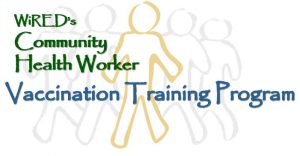COVID Vaccination Training Program
Community Health Worker Training Program
Train one, improve the health of many.
 Community health workers (CHWs) are a paraprofessional corps of local people expertly trained with proven success in offering a host of services that elevate the health of their communities where doctors and nurses are scarce.
Community health workers (CHWs) are a paraprofessional corps of local people expertly trained with proven success in offering a host of services that elevate the health of their communities where doctors and nurses are scarce.
In 2020 WiRED released a rigorous and comprehensive, WHO-compliant curriculum to train CHWs around the globe. The program is accredited by the School of Community and Global Health at Claremont Graduate University, which is accredited by the Western Association of Schools and Colleges.
Along with providing basic clinical services CHWs improve health behaviors such as adherence to HIV antiretroviral therapy, diabetes management and TB treatment completion, childhood immunization and early prenatal care. They offer health education and health surveillance and become the bridge between their communities and the formal health system.
Read More (leads to second page)
WiRED uses computer-based modules, taught in real-time by physicians and nurses, to groups of around 20 students. The 140-hour course covers health basics, patient assessment, clinical issues, health teaching and surveillance. Students who successfully complete a comprehensive final exam are awarded a certificate confirming course completion.
Each year, after completing their training, all community health workers are required to earn 50 continuing education units to maintain their certification. This program (we call CHWE—continuing health worker education) enables CHWs to reinforce their knowledge and learn new skills. They stay current on scientific findings and the latest diagnostics and treatments for health conditions that may impact their communities.
COVID-19 Vaccination Team Training
To be ready for vaccinations later, communities need to train vaccinators now.
Effective COVID-19 vaccines are now being released and, in time, they will reach underserved regions. The missing links in the vaccination chain will be trained people to administer the vaccinations in local communities. Without trained workers, vaccination programs grind to a halt. Large organizations and governments can provide the vaccines, but where will low-resource countries find enough trained people to vaccinate the population?
WiRED’s vaccination program will train people at the local level to move vaccines safely from central drop-off points to communities, prepare the communities for vaccinations, then to properly screen patients, administer COVID-19 vaccinations and monitor patients after the shot.
Read More (leads to second page)
Each vaccinator will receive 20 hours of WiRED’s curriculum based strictly on the World Health Organization’s (WHO) vaccination protocols. In addition, students will receive an addition 20 hours of instruction of basic health training, including human anatomy and physiology, principles of infectious disease control and a review of coronavirus infections. These frontline workers in training will also receive an additional five hours of clinical practice.
WiRED’s Vaccination Curriculum (based on WHO protocols)
Module 1: Introduction to COVID-19 vaccination training
Module 2: Storage, handling, delivery, and waste management of COVID-19 vaccines
Module 3: Organizing COVID-19 vaccination sessions
Module 4: Vaccinating process and procedures
Module 5: AEFI monitoring for COVID-19 vaccination
Module 6: Recording and monitoring COVID-19 vaccination
Module 7: Communication with the community about COVID-19 vaccination
